“Run Rabbit Run” by Flanagan and Allen
“Run Rabbit Run” was a popular song during World War II and achieved a level of cultural significance through the singing efforts of the British comedy-singing duo, Flanagan and Allen. During the 1930s, Bud Flanagan and Chesney Allen were part of the British entertainment group known as The Crazy Gang. It was here that the comedy-singing duo worked on the production of the stage revue, The Little Dog Laughed. Like other revues by The Crazy Gang, the production featured comedic songs and dances that poked fun at relevant issues of the time. One of these such songs was “Run Rabbit Run.” The music for this particular song was made by the famous British composer, Noel Gay, who frequently worked with the Crazy Gang. Additionally, the lyrics were written by the songwriter, Ralph Butler, who was specifically known to add comedic elements to his songs. And while listening to a song like “Run Rabbit Run,” one can identify the strange and even funny language being used to offer commentary on a very serious topic, World War II.
Lyrics to Flanagan and Allen’s “Run Rabbit Run”
On the farm, ev’ry Friday
On the farm, it’s rabbit pie day
So ev’ry Friday that ever comes along
I get up early and sing this little songRun rabbit, run rabbit, run, run, run
Run rabbit, run rabbit, run, run, run
Bang, bang, bang, bang goes the farmer’s gun
Run rabbit, run rabbit, run, run, run, runRun rabbit, run rabbit, run, run, run
Don’t give the farmer his fun, fun, fun
He’ll get by without his rabbit pie
So run rabbit, run rabbit, run, run, runRun rabbit, run rabbit, run, run, run
Run rabbit, run rabbit, run, run, run
Bang, bang, bang, bang goes the farmer’s gun
Run rabbit, run rabbit, run, run, run, runRun rabbit, run rabbit, run, run, run
Don’t give the farmer his fun, fun, fun
He’ll get by without his rabbit pie
So run rabbit, run rabbit, run, run, run
At first glance, the lyrics seem innocent enough. Nothing about a farmer hunting a rabbit seems to answer why the song became such a popular anthem for the British during World War II. But in order to fully appreciate what “Run Rabbit Run” signified to the British, we must first examine the historical context surrounding this very strange song.
As I have previously mentioned, “Run Rabbit Run” premiered during the production of the revue, The Little Dog Laughed. This was October 11, 1939. And while it is debatable what the song was originally intended to mean, the cultural significance to the song is rooted in what occurred just under one month after the song’s premiere. On November 13, 1939, the aerial warfare branch of the German military, known as the Luftwaffe, targeted British flying boats in Shetland. The German bombs missed their target but created a massive crater in Shetland which, when checked by locals, revealed two alleged victims to the bombing. This peculiar story leaves much up to public conjecture but is nonetheless detailed by an article on Strange History (available here).
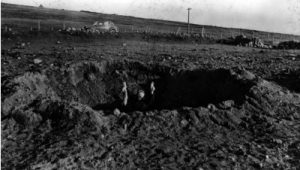
Alleged Victims to the German Luftwaffe
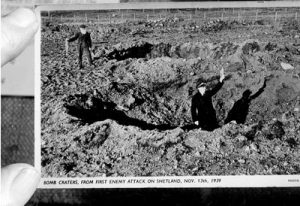
Postcard of Rabbit Victims
The above photographs are taken from the Shetland Museum archives (link here) and tell the story of two rabbits who were allegedly killed by the missed German Luftwaffe bombs in Shetland. I say alleged, however, because according to the Shetland Museum, the rabbits were not killed by the German bombs but were instead transferred into the crater from a butcher shop in Lerwick as a publicity stunt. The suggestion here is that the act was a publicity stunt to make the Germans appear inept. The Germans aim to bomb British flying boats but all they can do is kill a few rabbits. And while the incident does appear to be a hoax, it is credited for popularizing and giving new meaning to Flanagan and Allen’s “Run Rabbit Run.” The dead rabbit hoax became a symbol of German ineptness and this allowed Flanagan and Allen’s song to be parodied in ways that mocked Germans.
Parodies of “Run Rabbit Run” served as propaganda to ridicule Germans, particularly Hitler, and to raise British morale. The above video was an extremely popular adaptation to the song, replacing “Run Rabbit Run” with “Run Adolf Run.” The video shows Hitler trying to take on the British but failing at every move. The line”You’re no match altho’ we started scratch[ed]” points out that Germans attacked the British first but suggests that the British will win anyway. The very end shows a very comedic scene where Neville Chamberlain is chasing Hitler with an umbrella and Hitler is running away. It ties back to the propaganda the video is trying to spread, that the Germans are so out of their depth against the British that the British can win even using umbrellas as weapons.
The Lasting Cultural Significance
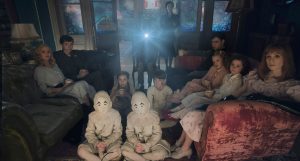
Miss Peregrine’s Home for Peculiar Children (2016)
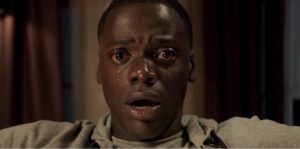
Get Out (2017)
Avid movie lovers will instantly recognize “Run Rabbit Run” for its widespread use in contemporary film. And while films like Miss Peregrine’s Home for Peculiar Children (2016) utilize the song to play into the anti-German rhetoric of World War II as it has been used in the past, a far more interesting use of the song is in the critically-acclaimed horror, Get Out (2017), where the song is used to tackle race relations in America’s current political state. In the film’s opening scene, a black man walks through a rural neighborhood and is attacked and thrown into the trunk of a car while Flanagan and Allen’s “Run Rabbit Run” plays in the background. Viewers quickly realize that the man was abducted based solely on his race and nothing else. This film is, of course, a criticism of all sides of the political spectrum and hints back to the song’s popularity during World War II. British propaganda pushed a political narrative based on race relations. The British associated their race with strength and resilience, while the Germans were considered to be monsters, a collective evil. And regardless of whether or not the British were right in their narrative, it does not change the fact that they used race for political gain, as Get Out exposes in today’s politics.
“Run Rabbit Run” is a truly fascinating song as based on the lyrics, we would never guess the song carries such significance in the wider conversation on World War II. The song was likely tailored towards British optimism, but I would think that rather than being used solely for the purpose of boosting morale, it was instead used as assurance of German weakness. When the British would listen to the song, they would be reminded that the Germans were so inept that in trying to bomb British property, they missed and killed rabbits. In this comedic interpretation of the German forces, the British would be encouraged to fight knowing that the Germans could never win because they simply lacked the intelligence.
Works Cited
“Run Adolf Run,” 1940. British Pathe Archive. https://www.britishpathe.com/video/run-adolf-run
“Luftwaffe Kills A Rabbit, Perhaps,” December 10, 2011. Strange History. http://www.strangehistory.net/2011/12/10/luftwaffe-kills-two-rabbits-perhaps/
Williamson, R. “Bomb Crater.” November, 1939. Shetland Museum Archives, http://photos.shetland-museum.org.uk/index.php?a=ViewItem&i=129694&WINID=1511835425265
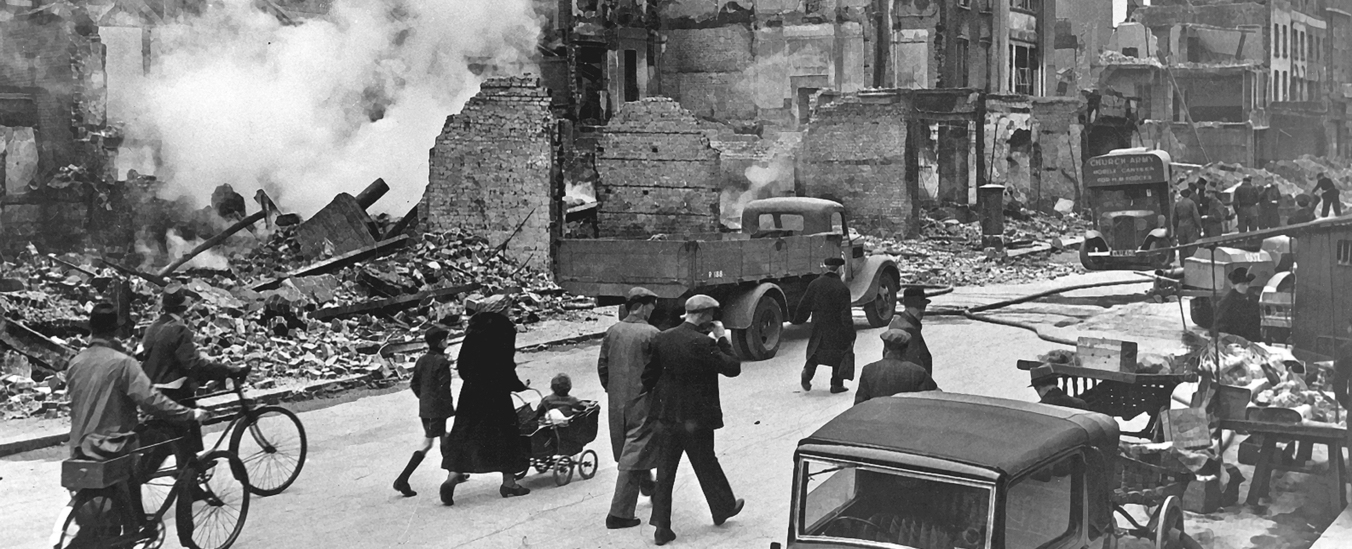



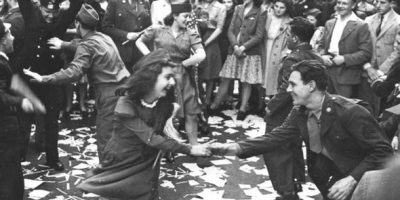


Melissa Dinsman
This was such a fun and interesting post to read. I loved the inclusion of the parody version and the idea that the rabbit hoax was used to improve British morale seems such an innocent story upon first read, but then shows the level of subtly British propaganda could achieve. I also really appreciate your discussion of the use of the song in popular culture today as a continued means to discuss race and politics.